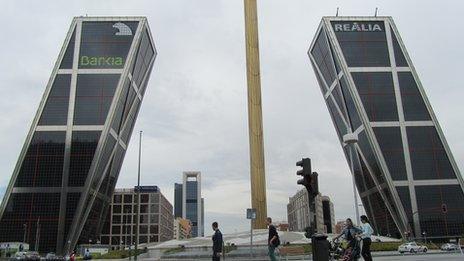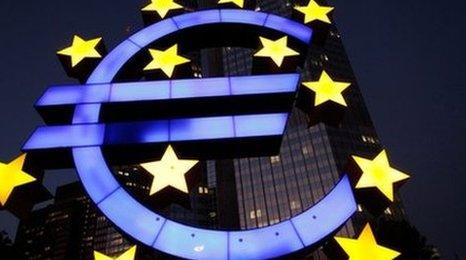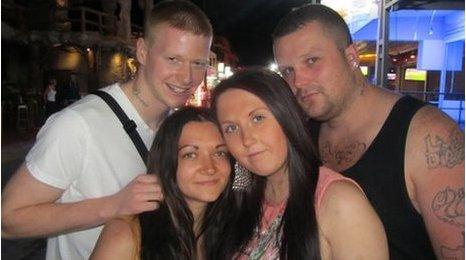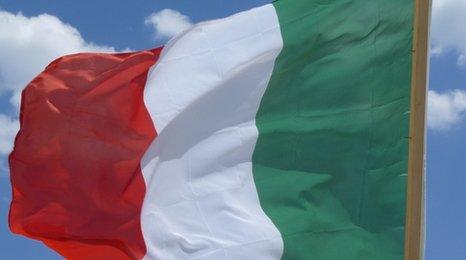Spanish banks to receive bailout to help with debt crisis
- Published

Spain has become the fourth and largest country in the eurozone to ask for help with a debt crisis.
The country's main problem is its struggling banks.
It means the finance sector will receive up to £80 billion but the UK isn't contributing to that loan.
Twenty-three-year-old Oscar is enjoying the sun from his jewellery market stall in Plaza de Castilla.
From his chair, you can see the magnificent glass skyscraper of the Bankia headquarters.
It's one of Spain's largest banks and at 250 metres (820ft), the tallest building in Spain.
Oscar says: "People come and take pictures and say, 'Wow, it's beautiful', but it's nothing. They are just robbers."
It's a sentiment shared by others.
On one of the green Bankia cash machines near the metro, there is graffiti in red spray paint. It reads ladrón - thief in Spanish.
One man who's withdrawing some money says: "It's a nightmare. People are so angry with the banks."
'Cheeky'
Bankia is the fourth largest lender in Spain with 12 million customers.
It was formed when several regional banks were brought together because they couldn't cope with the knock from the economic downturn.
Last month Bankia asked for a billion euro bailout because it has serious exposure to bad property debt.
Victor, who's having lunch in a café nearby, says: "They are cheeky. They caused the problems and now want even more money."
Outside the headquarters, many suited bankers rush out through the revolving doors, talking into their smartphones and avoiding eye contact. Few want to talk.
"I'm sorry but it's not appropriate for me to speak to you," says one financier anxiously. Others shake their heads and walk away quickly.
Round the corner outside one of the bars, two men are smoking and checking their watches. Both work as bankers and take some persuading before talking.
"It may be bankers to blame, but I think everyone should step forward and take responsibility," says one of them.
"People have been asking for money from the banks when they couldn't afford to pay their mortgage."
When Spain joined the euro, the government there avoided cheap loans, but banks and Spanish people generally didn't.
The property sector was thriving and more people were taking on bigger mortgages.
"The system and society here has made people feel they can buy whatever they want, no matter how little money they were on," adds the banker.
Another point to the fact banks aren't regulated there and that Spain's regions, which control their own finances, have been overspending - both things have helped push up borrowing costs leading to Spain's economic problems.
"They say bankers are greedy, but everybody's greedy," says the banker. "It's the system that's corrupt in Spain."
- Published7 June 2012

- Published6 June 2012

- Published18 May 2012

- Published15 May 2012

- Published15 May 2012

- Published22 September 2011
